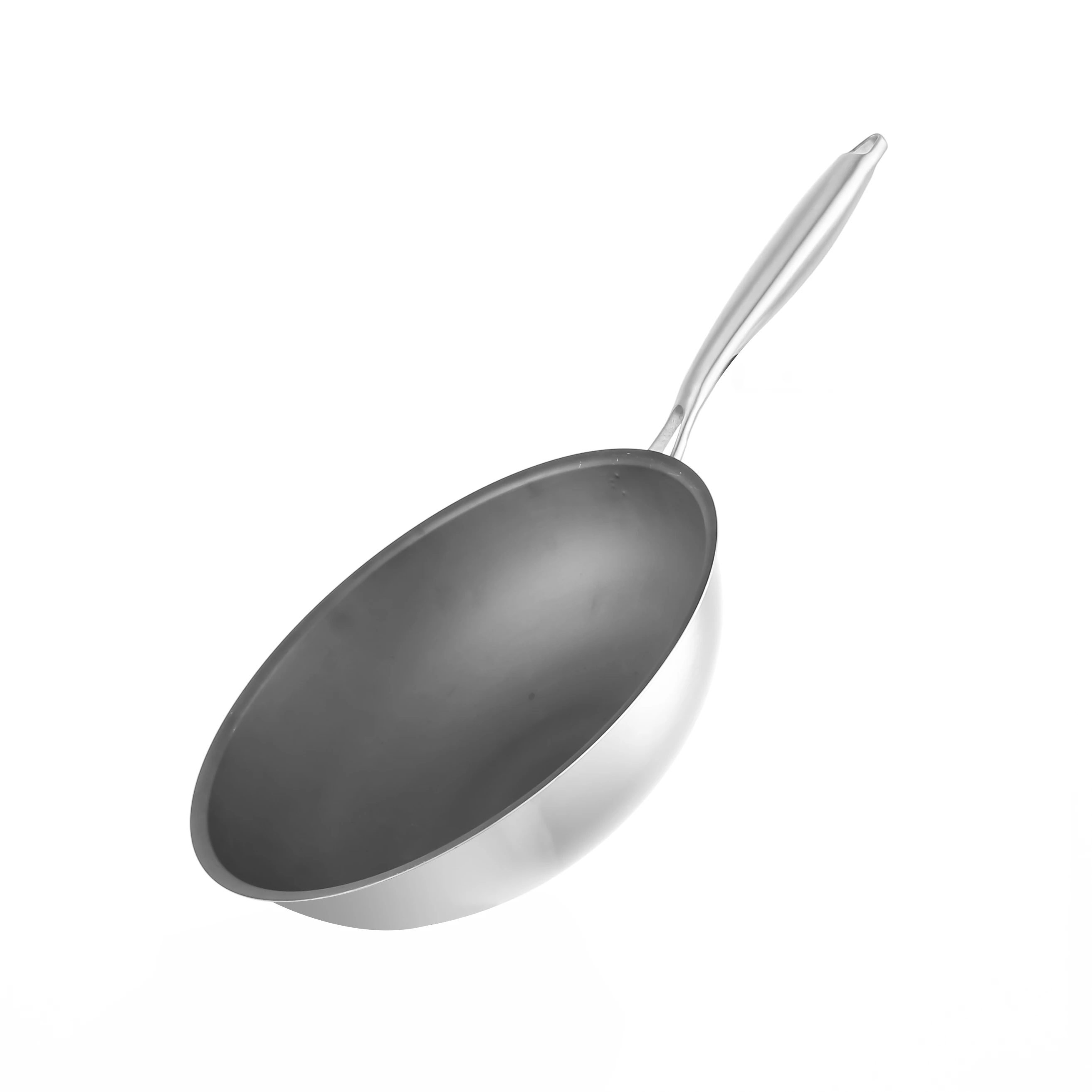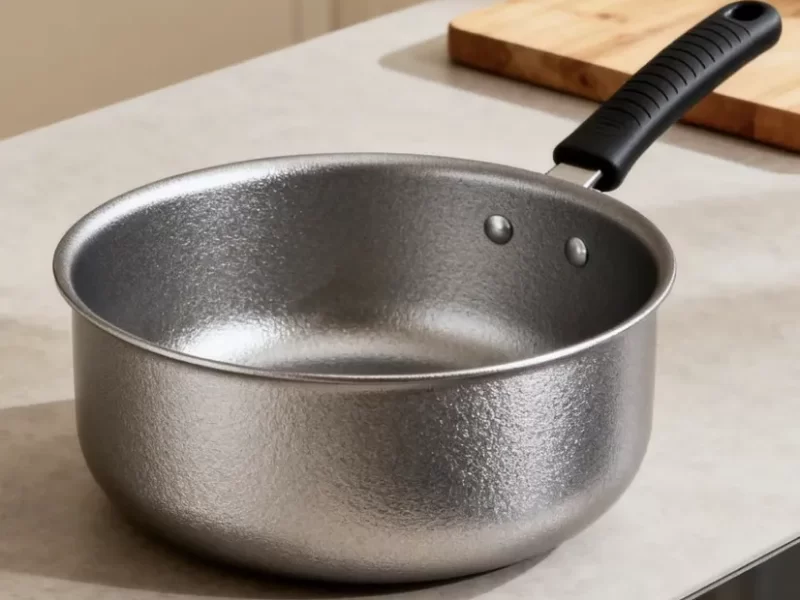
It shall be noted that with the coating intact, there is not much difference in cooking safety between the two, and they are safe. But their sources of “security risk” and reliability for long-term use are significantly different.
Now, allow Hengguang, a professional titanium cookware manufacturer, to make a comparison from several perspectives for you and your cooking health
Chemically Coated Titanium Cookware
The “chemical coating” here usually refers to the polytetrafluoroethylene (PTFE) coating, which is often referred to as the “Teflon” coating.
Advantages:
- Superior non-stickiness: This is its core advantage, ideal for fried eggs, fried fish, etc., with less oil and easy to clean.
- Convenient cooking: suitable for kitchen novices, not easy to stick to the pan and burn.
Security Risks and Considerations:
- Coating Degradation Risk (Key Risk):
High-temperature decomposition: When the pan is burned empty or the temperature continues to exceed 260°C, the PTFE coating will begin to become unstable and will decompose significantly above 350°C, releasing fumes and chemicals that are fatal to birds and potentially harmful to humans. Normal cooking (such as frying and stir-frying) rarely reaches this temperature, but dry roasting is easy.
Physical peeling:
Brushing with metal spatulas, wire balls, or bumping can cause the coating to scratch and peel. These ingested coating fragments are chemically stable and are considered harmless to humans (they will be excreted directly from the body), but the exposed base of the pan after peeling off may cause food to stick, burn, and affect subsequent cooking.
- Perfluorinated Compounds (PFOA/PFOS):
In the past, PFOA (a possible carcinogen) was used in the production of PTFE, but modern regular brands of coated pots have long been PFOA-free. Choose a well-known brand when buying to avoid this risk.
Safety Summary:
At the heart of safety for chemically coated titanium pans lies their use and maintenance. It is safe when the coating is intact and avoids dry burning at high temperatures. However, its safety will decrease over time and with the wear of the coating.
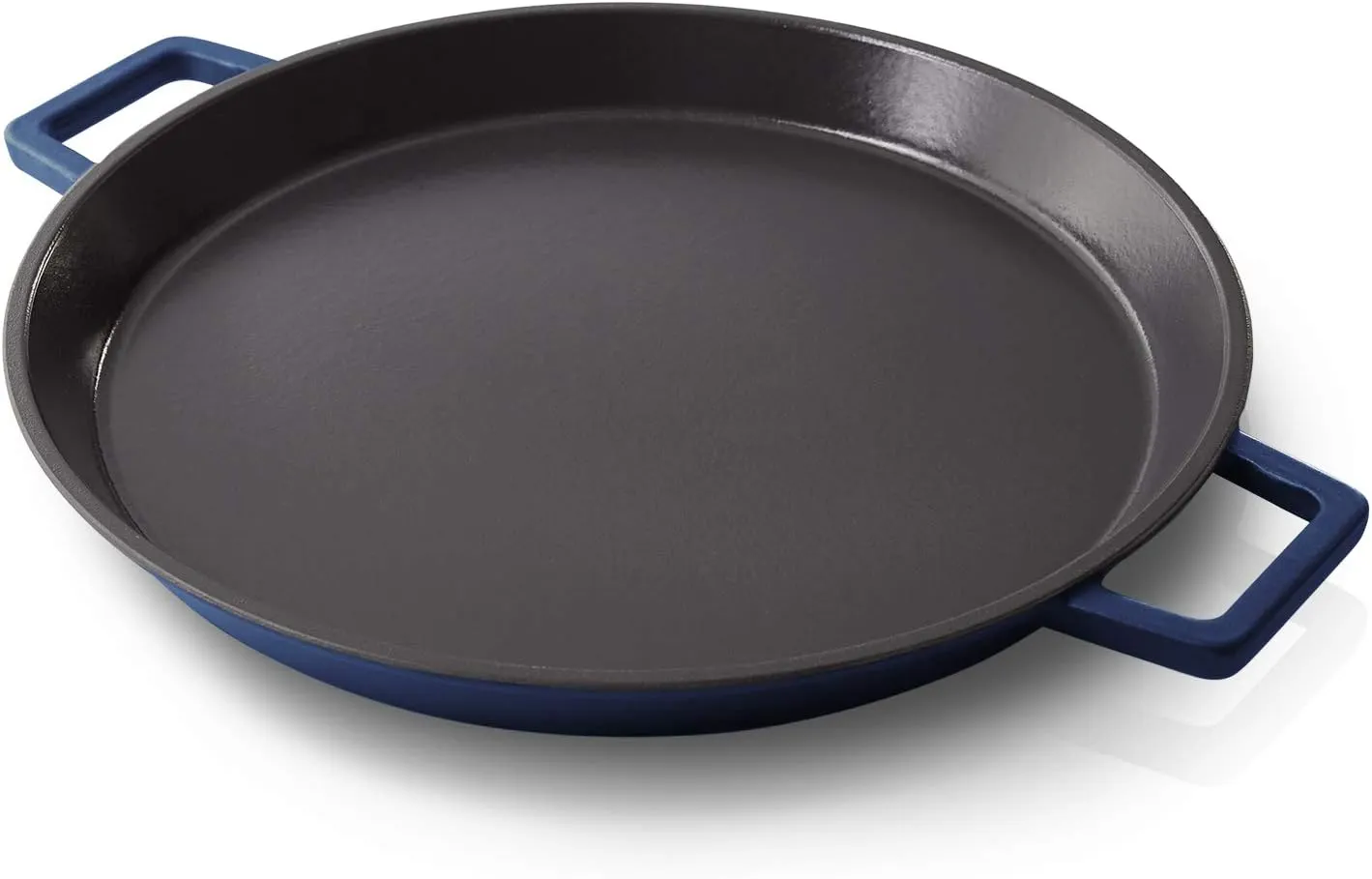
Uncoated Titanium Cookware
The pure titanium pot itself is very stable, but the thermal conductivity of pure titanium is very poor and the cost is high, so the common “uncoated titanium pot” on the market is usually a titanium alloy pot, or a multi-layer structure of “titanium + other metal composite” (such as aluminum or copper sandwich in the middle to improve thermal conduction).
Advantages:
- Extremely high chemical stability: Titanium is a very inert metal that does not react with acids and alkalis in food, does not rust, and does not give food a metallic taste.
- Super durability: With high hardness, extremely wear-resistant, it is not afraid of metal spatulas, and extremely long service life.
- High temperature resistance: It can withstand very high temperatures without the risk of coating decomposition, suitable for stir-frying.
Security Risks and Considerations:
- Sticky and burnt risk: This is a natural characteristic of uncoated pans. After sticking to the pan, the food is easy to burn, and the burnt and carbonized food itself contains carcinogens (such as acrylamide, polycyclic aromatic hydrocarbons, etc.). From this perspective, uncoated pans can produce unhealthy substances if the cooking skills are not good. It is necessary to master techniques such as “hot pan and cold oil” to physically prevent sticking.
- Metal migration problems: Titanium itself is very safe and is even used in medical implants. However, if it is titanium or multi-layer pots, you need to pay attention to whether other layers of metals (such as aluminum) will migrate. However, at normal cooking pH and temperature, this migration is minimal and is isolated by a stable titanium layer, making the risk extremely low.
Safety Summary:
The safety of uncoated titanium cookware lies in the user’s cooking skills. The cookware itself is very stable and safe, but if used improperly can cause food to burn, and it can pose health risks. Its security is long-lasting and stable.
Comparison Table
| Feature | Chemically Coated Titanium Cookware | Uncoated Titanium Cookware |
|---|---|---|
| Core Safety Risk | Coating degradation and flaking | High needs soft tools and gentle washing |
| Long-term Safety | Decreases as coating wears | Stable and consistent over time |
| Non-stick Ability | Excellent; ideal for low-oil cooking | Moderate; requires technique and oil |
| Durability | Moderate; coating prone to scratches | Excellent; scratch-resistant and long-lasting |
| Maintenance | High; needs soft tools and gentle washing | Low; can use metal utensils |
| Best For | Beginners and low-fat cooking lovers | Burned food produces harmful compounds |
Is There a Big Difference in Cooking Safety?
From the perspective of the material itself, under the premise of correct use, there is little difference, and it is safe.
In terms of risk type and long-term reliability, there is a big difference.
- Differences in risk types: The main risk of coated cookware lies in the potential decrease in performance and particle ingestion caused by coating wear and peeling; The main risks of uncoated pure titanium cookware are food adhesion and difficulty in cleaning.
- Long-term reliability difference: Uncoated pure titanium cookware is almost permanently durable in structure and materials, and theoretically can be used for life; The lifespan of coated cookware is limited by the durability of the coating. Once the coating fails (usually after a few years), the non-stick performance of the cookware will be lost
How to Choose the Right Titanium Cookware
If you are looking for the ultimate in convenience, non-stick, and easy to clean, and can commit to the following:
- Never dry burn or cook at excessive heat.
- Use only wooden or silicone spatulas.
- Hand wash with a soft cloth and never use wire balls.
- Replace the coating as soon as it is noticed that it is scratched or begins to peel.
Well, chemically coated titanium cookware is a good choice.
If you value long-term health and safety, durability, and once and for, and are willing to improve your cooking skills:
- Learn and master physical anti-stick methods such as “hot pan cold oil”.
- Don’t mind using the right amount of cooking oil.
- Hopefully, one cookware will last for many years.
Then, uncoated titanium cookware is a safer and more economical choice.
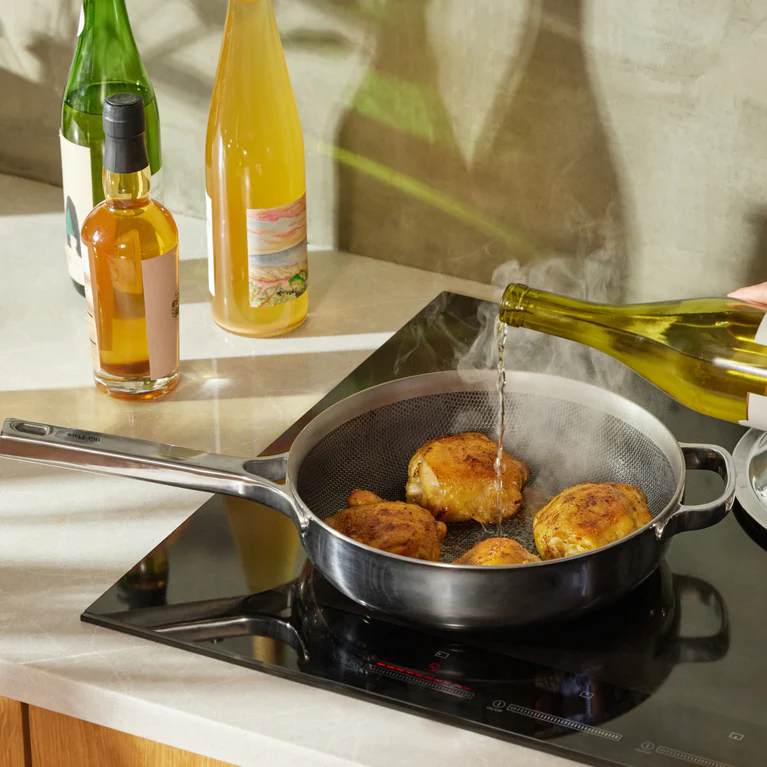
Conclusion
The “safety lifespan” of coated titanium cookware depends on how carefully you use it, while uncoated titanium cookware’s safety depends on how skillfully you cook. One needs care, the other practice—but both can serve a healthy kitchen when used right.
About Henggaung
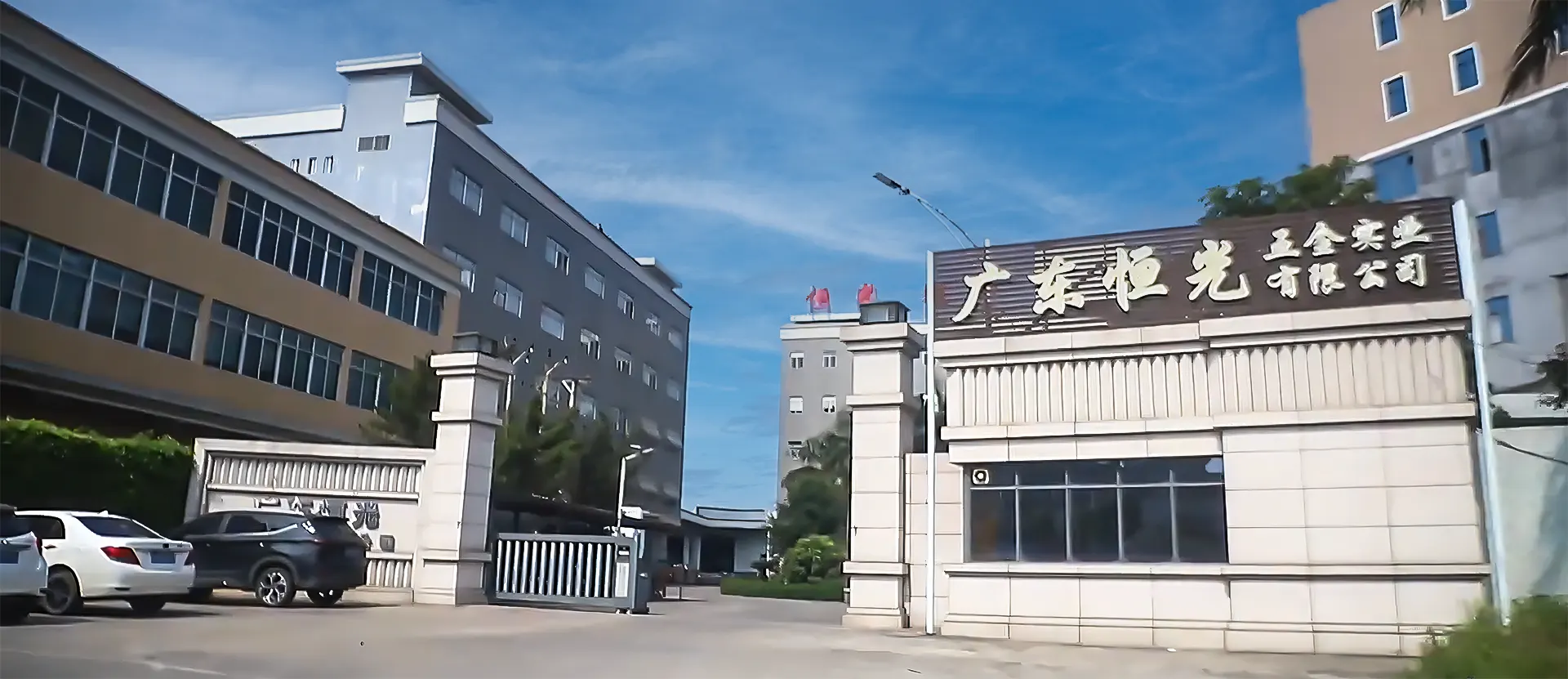
At Hengguang, precision defines our craftsmanship. As a professional titanium cookware manufacturer, we integrate advanced automation with a team of seasoned engineers to ensure every piece meets the highest performance standards. Our custom titanium cookware solution is supported by a strict QA framework that aligns with global certification systems, guaranteeing durability, consistency, and confidence for every wholesale partner.
